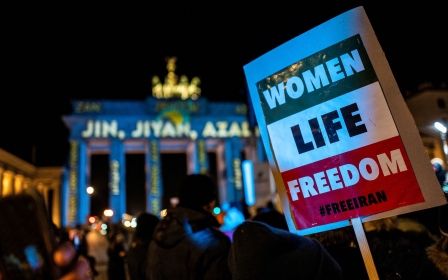US lawmakers introduce legislation to counter Iran maritime threats

Members of the Senate and House Abraham Accords Caucuses introduced legislation on Thursday designed to counter maritime threats emanating from Iran, the same day Tehran seized a US-bound tanker.
The measure looks to build on previous legislation that strengthened regional air and missile defence projects between Israel and Middle Eastern countries.
If it passes, the act would require the Department of Defence to develop a strategy with partners and allies in the Middle East to counter maritime threats posed by Iran, violent militant organisations, and criminal networks.
“Shoring up maritime security cooperation between the United States, Israel, and our partners in the region is our next step down the road to achieving a lasting peace and securing a more prosperous future for all,” said Congresswoman Cathy McMorris Rodgers, who introduced the legislation.
Iran seized a US-bound oil tanker off Oman on Thursday, saying it had crashed into an Iranian vessel leaving two crew missing.
New MEE newsletter: Jerusalem Dispatch
Sign up to get the latest insights and analysis on Israel-Palestine, alongside Turkey Unpacked and other MEE newsletters
The US Navy demanded the immediate release of the Marshall Islands-flagged tanker, saying it was transiting international waters in the Gulf of Oman and slamming Iran’s "continued harassment of vessels”.
It is one of a spate of incidents since 2018, when then-US president Donald Trump pulled out of a nuclear agreement and reimposed crippling sanctions on Iran, sending tensions soaring.
"The Iranian government should immediately release the oil tanker," the Bahrain-based US Fifth Fleet said in a statement.
On Friday, the Financial Times reported that the seizure appeared to be in retaliation for a prior US seizure of Iranian oil, which Iran had recently unsuccessfully lobbied to retrieve.
Iran has developed a predictable pattern of reciprocal vessel seizures against the West.
In May 2022, Iran seized two Greek oil tankers in the Gulf, in what appeared to be retaliation for Athens' assistance in the US confiscation of a Russian-flagged tanker loaded with Iranian oil last month. Iran released the vessels in November.
Thursday’s act is in keeping with efforts by the Biden administration and many members of Congress to deepen security cooperation between Israel and Washington’s Middle East allies.
Congress passed a bill, known as the "DEFEND Act" in the 2023 National Defense Authorization Act that requires the Pentagon to submit a strategy for an integrated air and missile defence system among Israel and Arab states.
Countries named in the bill include Israel, Jordan, Egypt and Iraq, as well as the six members of the Gulf Cooperation Council which includes Saudi Arabia, the United Arab Emirates, Qatar, Bahrain, Kuwait, and Oman.
The UAE, along with Morocco and Bahrain, signed a US-brokered agreement to normalise ties with Israel during the final months of the Trump administration.
The agreement, known as the "Abraham Accords", shattered a longstanding Arab consensus that there should be no normalisation with Israel until it reaches a comprehensive peace deal with the Palestinians.
“The Abraham Accords have enabled unprecedented security cooperation between Israel and Arab partners. Recent hostile naval actions by Iran and its terrorist proxies demonstrate the significant threat that Iran poses to maritime security in the Middle East,” US Senator, Jacky Rosen, who co-chairs the Senate Abraham Accords Caucus, said.
A companion act to the House bill is being introduced in the Senate.
While tensions between the US and Iran remain high, US partners in the Gulf have sought to mend fences with Tehran.
In March, Saudi Arabia agreed to reestablish diplomatic relations with Iran, in a deal brokered by Washington’s arch-rival, China.
Benjamin Netanyahu’s return to power in Israel and his reliance on far-right and ultra-Zionist allies have also complicated his efforts to expand the Abraham Accords, including to Saudi Arabia.
Middle East Eye delivers independent and unrivalled coverage and analysis of the Middle East, North Africa and beyond. To learn more about republishing this content and the associated fees, please fill out this form. More about MEE can be found here.





